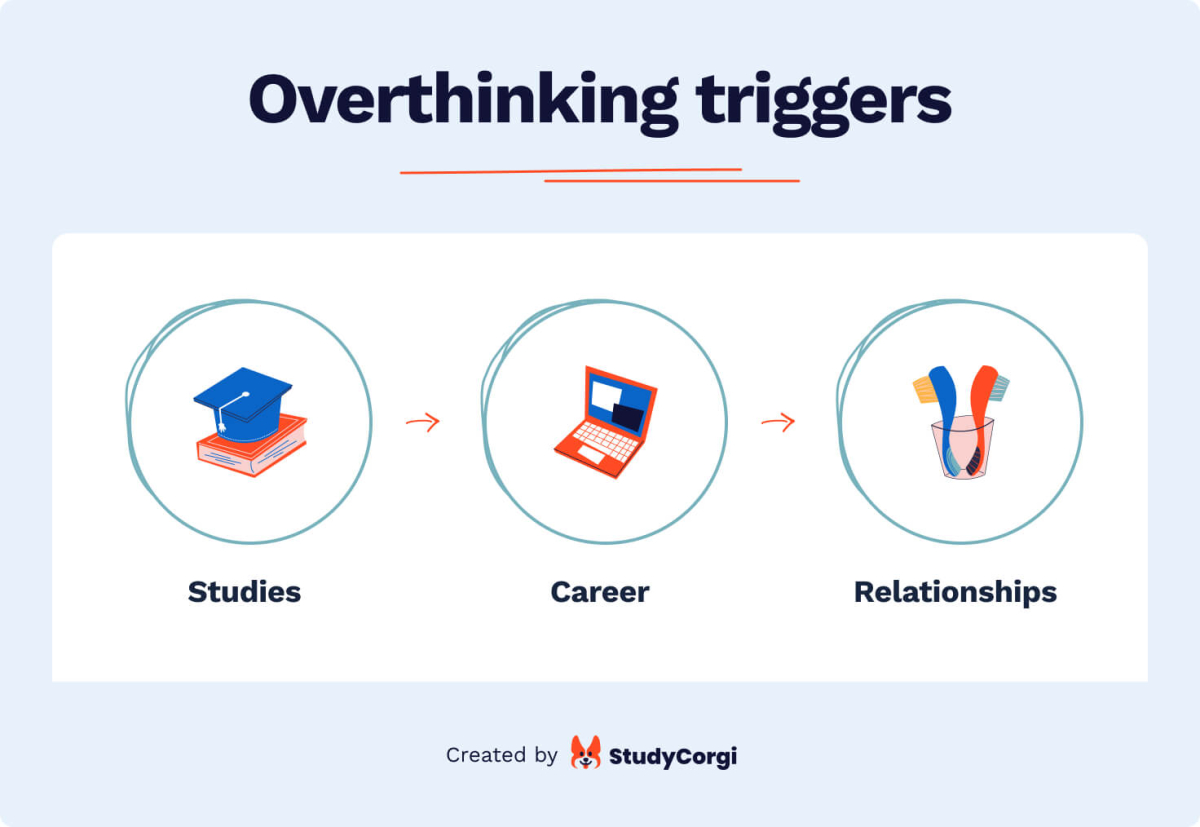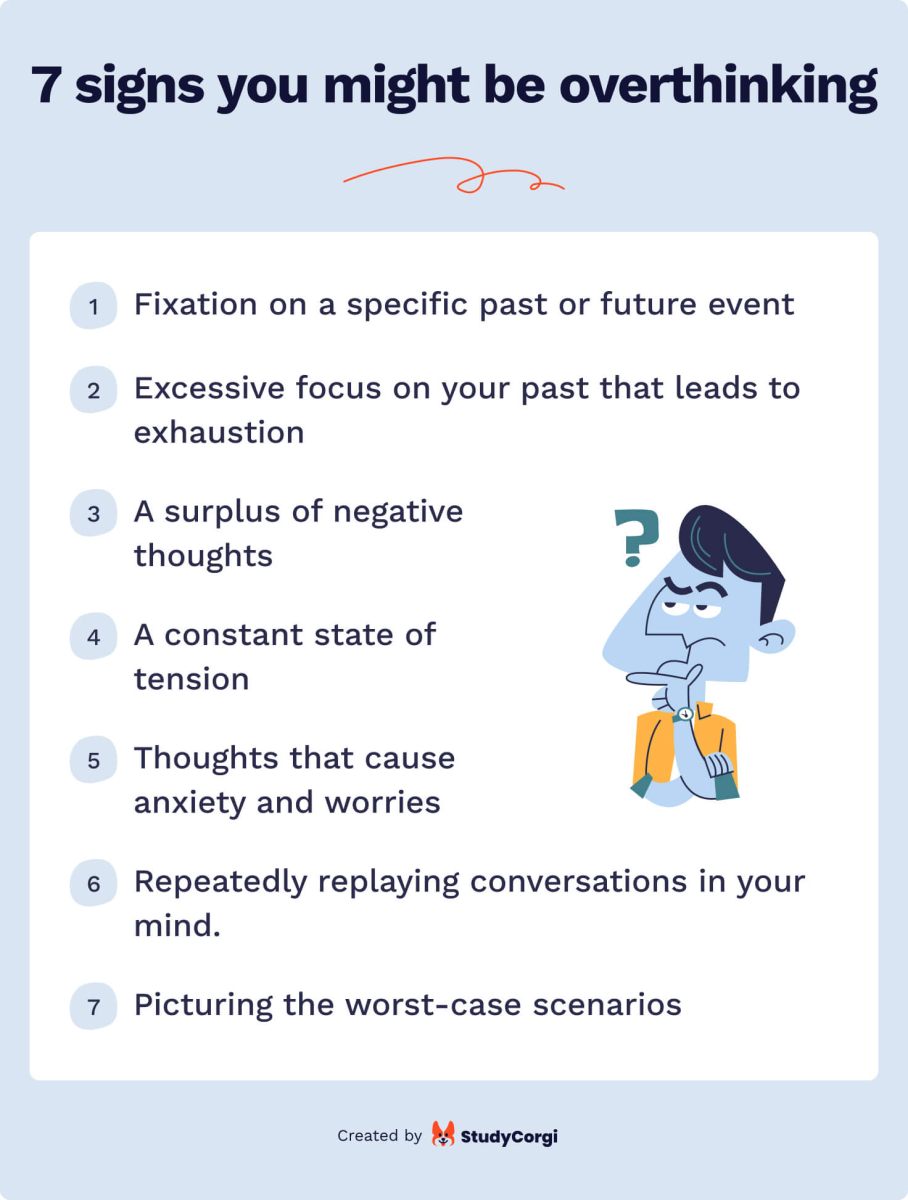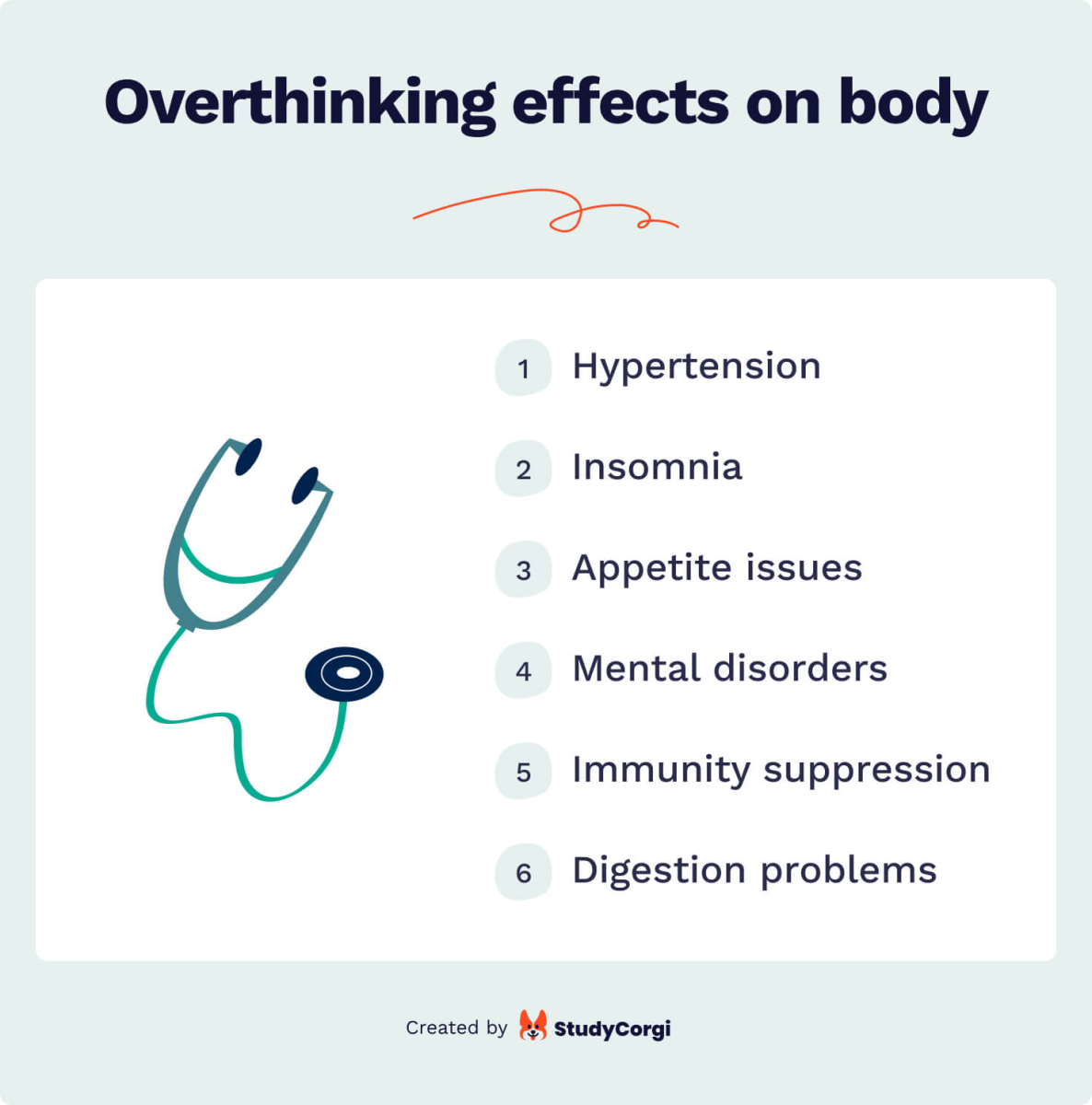It’s okay to be somewhat reflective and contemplate certain events in your life, such as a meeting with fellow students, a test, or a presentation.
However:
Dwelling excessively and intensely on a single event or moment can lead to the unhealthy habit of overthinking, trapping individuals in a cycle of self-analysis and self-criticism.
If you find yourself in the vicious circle of overthinking and struggle to break free, you’re in the right place.
In this guide, we share essential tips for identifying the issue of overthinking, discuss effective techniques to overcome this destructive habit, and explore beneficial mindfulness exercises to help you return to the present moment.
🧠 What Is Overthinking?
As the term suggests, overthinking involves excessive rumination about something that has already happened or is about to happen. While the practice of thoroughly analyzing a specific event or issue may not seem harmful, overthinking can turn your life into a nightmarish loop, fixating on trivial details and preventing you from focusing on things that really matter.

In essence:
The state of overthinking is the opposite of being present, as it entails constant rehashing of thoughts about the past or future rather than fully experiencing the here and now.
Mindfulness, a technique of noticing and enjoying the present moment, proves challenging for many people, no matter how simple it sounds. As a result, frequent overthinking can contribute to mental health issues, stress, depression, and phobias.
How Many People Tend to Overthink?
If you believe you’re one of the unfortunate individuals plagued by the bad habit of overthinking, we have good news: you’re not alone in facing this issue.
A comprehensive 2003 study conducted by a team of researchers from the University of Michigan revealed that the problem of overthinking is alarmingly widespread, especially among young people.
The researchers discovered that 73% of individuals aged 25-35 are prone to overthinking, in contrast to 52% of those aged 45-55 and 20% of individuals aged 65-75.
The statistics are unequivocal – mastering the art of living in the present takes time, a skill that older adults seem to have perfected.
The study also found that women are more prone to overthinking, and this habit leads to detrimental effects on mental health and overall well-being.
Overthinking is associated with depressive re-evaluations of past events, negative thoughts about the present related to those past failures, and a sense of hopelessness about future prospects.
Furthermore:
Overthinking is often linked to anxiety, depression, alcohol abuse, and a higher likelihood of experiencing suicidal thoughts.
In this way, overthinkers are more vulnerable to mental health problems and tend to experience significantly lower life satisfaction – a devastating, far-reaching impact that should be avoided at all costs.
🤔 Causes & Symptoms of Overthinking
If we look deeper into the psychological mechanisms of overthinking, we’ll find that things work rather simply here.
The human brain seeks to enhance its control over events in a person’s life, thus reducing uncertainty. It considers multiple scenarios of potential events, preparing the person for each one, even if 99% of those situations are unlikely ever to occur.
The causes that trigger overthinking can stem from various life domains:

In this manner:
The brain’s efforts turn out to be futile and exhausting for the individual, as it exerts much effort due to the person’s low tolerance for uncertainty, fears, past traumas, and perfectionism.
It’s also worth noting that the habit of overthinking may be a hidden symptom of a mental health issue, such as:
- Social anxiety
- Impending depression
7 Signs You Might Be Overthinking
So, how can you detect the habit of overthinking early and take action to curb it?

Here are the most common alarming red flags you may notice:
- Fixation on a specific past or future event without the ability to switch to other thoughts.
- Excessive focus on your past leading to a deterioration in your mood and a sense of exhaustion.
- A surplus of negative thoughts.
- A constant state of tension that makes it difficult to relax, unwind, and fall asleep easily.
- Thoughts that cause anxiety and worries.
- Repeatedly replaying conversations and situations in your mind.
- Picturing the worst-case scenarios when thinking about future events.
🩺 How Does Overthinking Impact One’s Health?
No matter how innocent and insignificant this habit may seem at first glance, you should be cautious about its far-reaching and accumulating impact on your health and well-being.
Overthinking can lead to problems on both a physical and psychological level.
By leaving this habit unattended, you may develop the following issues.

#1 Hypertension
Overthinking is closely related to stress, which can elevate your blood pressure and create a favorable environment for the development of cardiovascular diseases.
Unhealthy coping mechanisms such as smoking and binge eating significantly increase the risk of heart attack.
#2 Insomnia
Overthinkers often fall into a vicious cycle of:
- Low morning energy
- Depressive thoughts resulting from a lack of refreshment
The inability to fall asleep leads to morning fatigue, making it challenging to focus on productive tasks. This often results in individuals falling back into the cycle of overthinking, further exacerbating their condition.
#3 Appetite Issues
Excessive fixation on troubling thoughts can have a negative impact on your appetite.
Overthinkers often fail to pay sufficient attention to their body’s signals, leading to irregular eating patterns or overeating.
Both behaviors can be detrimental in the long run and may contribute to more significant appetite regulation problems.
#4 Mental Disorders
Prolonged focus on negative thoughts and worries can lead to detrimental changes in the brain’s structure, connectivity, and chemical composition. This habit can significantly increase the risk of developing chronic mental health disorders, such as stress and depression.
Moreover:
Even if you don’t feel overly depressed, you may notice negative changes in your problem-solving and decision-making abilities.
#5 Immunity Suppression
Chronic worries and anxieties can lead to persistent increases in cortisol levels in the human body, which poses a significant threat to your immune system.
To put it simply:
When your immune responses are chronically suppressed, you become more susceptible to colds, infections, and various diseases. Chronically stressed people are also prone to developing allergies relatively quickly.
#6 Digestion Problems
Hypertension, impaired blood flow, and lower oxygenation of your tissues and organs can inevitably lead to gastrointestinal problems.
Additionally:
Your stomach health is closely linked to your mental well-being, and chronic stress and anxieties can contribute to the development of inflammatory bowel disease, gastritis, digestive issues, and more.
As you can see, the impact of overthinking can be truly devastating, especially for students who are often exposed to stress, unhealthy eating, and lack of sleep.
Let’s explore practical solutions to this problem.
🎯 11 Tips to Stop Overthinking
We’ve compiled a list of effective strategies to help you overcome the unhealthy habit of overthinking.
Read on to find the one that might work best for you. At the end of this guide, you’ll find an infographic that summarizes the tips and exercises we describe in the next two sections.
#1 Recognize ANTs (Automatic Negative Thoughts)
ANT is an acronym for Automatic Negative Thoughts.
ANTs are automatic, unconscious reactions to events and situations that your negative past experiences may trigger.
To address this issue, you can journal situations that make you anxious or angry and reflect on your reactions to them. Once you clarify what troubles you, develop healthier alternatives for emotional responses to these situations to correct your reactions.
For example:
If you feel bad after failing to answer a professor’s question in class, journaling the issue might reveal that it’s not about the material but about your shyness during public performances. A positive resolution could involve asking the professor for an individual session to review your knowledge or consciously working on your social anxiety.
#2 Practice Positive Reframing
Our reactions to situations, as well as their long-term psychological impact on us, depend on how we frame them for ourselves. That’s why overthinkers often fall into the trap of automatically framing every challenge negatively.
The solution lies in the positive reframing technique, which involves acknowledging the negative aspects of a situation and then seeking an alternative, positive evaluation.
By finding something positive and developing the habit of positive reframing, you can find solutions to minor problems instead of dwelling on them for a long time.
Here’s an example of positive reframing:
Imagine you’re rushing to an exam in the morning only to find out that it was rescheduled three hours later. Your initial negative thought might be, “Oh God, I could have slept three more hours!” This thought may sour your mood and leave you feeling exhausted and irritated by the time the exam starts. Positive reframing in this situation could be as follows, “Wow, I have three more hours to review my lecture notes. I’ll grab some coffee now and thoroughly review all materials once more.”
#3 Distinguish Between Fear and Intuition
Overthinkers often struggle to differentiate between a chronic fear of making mistakes and genuine intuition warning them about a potentially bad idea.
You can regain self-confidence by reconnecting with your body and learning to listen to its signals.
This way, you can determine whether fear or intuition is behind your hesitation and ultimately make the right decision.
Here’s an example:
Imagine you’re on the verge of entering a joint venture with a classmate. You’re about to invest all your savings, with the potential for substantial gains if it succeeds. If you find yourself indecisive in this situation, consider whether your hesitation stems from a fear of taking on new responsibilities and the possibility of failure or if an inner voice is trying to tell you that your classmate may not be as reliable as you thought. Perhaps you noticed something in their words or attitudes that raised concerns, and now your intuition is sending you signals that you shouldn’t ignore.
#4 Pay Attention to Your Feelings
At times, positive reframing alone may not be enough to break the cycle of overthinking. In reality, we often engage in overthinking to silence our negative emotions.
That’s why it’s essential to stop, take a deep breath, and make an effort to understand those feelings and their underlying causes.
The truth is that emotional awareness and the acceptance of your feelings are pathways to inner comfort, which could be your magic formula for wellness.
Here’s an example:
Let’s say you feel angry and annoyed about having to wake up at 5 a.m. on Sunday to complete a Psychology assignment. You have been postponing this task until the last moment, and the issue is not with your professor or your lack of understanding – it’s your irrational emotions. You can’t seem to get past the first few lines of the assignment. If you take a few minutes to relax, acknowledge the bitterness of waking up early on a Sunday, and forgive yourself for the procrastination, focusing on the task and completing it in a couple of hours becomes a reality. Otherwise, you might waste your entire Sunday on futile anger and self-blame.
#5 Maintain a Gratitude Journal
During challenging times when positivity seems scarce, it’s essential to bolster your emotional resilience and cultivate positivity.
You can achieve this aim by keeping a psychological practice that can teach even the most pessimistic individuals to recognize the positive aspects of their surroundings.
For instance:
Сhoose a nice journal, whether physical or digital, and select a place where you feel comfortable. Write down several specific things you’re grateful for today. Avoid writing vague, generic phrases like “I’m thankful for my health.” Instead, focus on something highly specific, such as “I’m grateful that I woke up early enough to hit the gym and run 5 km today.”
#6 Pause and Reflect
The most common cause of mistakes and regrets is impulsive action. Typically, people react emotionally to challenges and then endlessly ruminate on those situations, attempting to change the unchangeable.
So:
The best technique for getting rid of overthinking is to stop being impulsive.
Once you face a challenge or problem, write it down and let it go for a couple of hours or even a day. Your emotions will settle down, and you will be able to respond to the situation much more reasonably.
Here’s an example:
Imagine you’ve received an email with very negative feedback from your professor on the latest essay. Your first reaction might be to defend or clarify yourself, making you sound irrational or emotional and losing the chance for a constructive discussion with your professor. Instead, take your time to relax and calm down, reviewing the feedback again to see where you can improve and clarify your work.
#7 Then Take Action
Overthinking is mostly about tormenting yourself with thoughts and assumptions, which may never turn into any form of action.
The solution to this vicious cycle of negative thoughts is to take action regarding the troubling situation.
Only by acting can you determine whether your concerns are justified or baseless.
Here’s an example:
Let’s say you’re thinking of calling your boyfriend after a recent quarrel. You fear he will refuse to talk to you, and you’ll spend sleepless nights worrying about why everything went wrong. In this situation, the optimal decision would be to initiate a conversation and discuss the matter openly and sincerely, working through a problem together.
#8 Seek Solutions
Edith Eger, an Auschwitz survivor, published her book, “The Gift,” at the age of 90. This inspirational life story contains a brilliant idea for everyone grappling with self-defeating thoughts – distinguishing between a victim’s mindset and a survivor’s approach.
Victims approach life with questions like “Why me?” while survivors address life’s challenges with a “What now?” question.
To shift from a victim’s position to a survivor’s, you need to start seeking solutions instead of burying yourself under blame, fear, and pity.
For example:
If you’ve been placed on probation because of a series of low grades, instead of feeling sorry for yourself and succumbing to fears of expulsion, you can create a study plan, join college student support groups, attend all lectures, and systematically address your study gaps to regain your place in college.
#9 Help Others
People are social creatures, so one of the easiest ways to get out of a rut is to do something positive for others. This can boost your self-esteem and positivity by being helpful to people.
For example:
If you have a classmate who is struggling in a subject you excel in, you can organize a weekend study session to help them overcome their academic challenges. In doing so, you’ll experience the gratification of their appreciation and enhance your overall well-being.
#10 Take Care of Yourself
An interesting fact is that people tend to practice less self-care during periods of stress. They eat poorly, don’t pay enough attention to their sleep, and neglect their appearance. That attitude can lead to a vicious cycle of diminishing self-esteem, a bad mood, and health problems, which in turn causes more stress and overthinking.
A way to break free from this situation is to take better care of yourself when you’re experiencing stress.
By doing so, you can mitigate the impact of stress and recover more quickly.
For example:
Many students resort to junk food during exam preparation. As a result, they experience a lack of energy, have trouble waking up in the morning, and feel fatigued and demotivated. A more effective approach for productive studying is to consume healthy superfoods to nourish the body and mind, ensure adequate sleep, and take walks outdoors to revive the body’s resources.
#11 Use Mindfulness Techniques
Practicing mindfulness is a great way to reconnect to the present moment and break free from the cycle of dwelling on the past or worrying about the future. A 2018 study conducted by Hofmann and Gomez demonstrated that mindfulness techniques can have a positive impact comparable to that of Cognitive Behavioral Therapy (CBT). This suggests that people can use mindfulness as a self-help tool to reduce anxiety and depression, leading to tangible improvements in their overall quality of life.
For instance:
If you’re stressed about receiving a low grade on your recent Philosophy test, you might find yourself ruminating on why it happened, what you could have done differently, and how you could have approached the topic better. Instead of getting caught up in unchangeable past events, you can consciously bring back to the present moment and consider ways to assess the situation, such as talking to your professor about retaking the test, improving your preparation for the next assignment, or completing an optional task to boost your grade.
🧘 3 Simple Mindfulness Exercises for Overthinkers
Here are 3 simple yet effective techniques for improving your mindfulness and reducing the impact of overwhelming negativity.
#1 Raisin Meditation
This meditation technique is simple yet highly effective for enhancing your mindfulness and reducing the impact of overwhelming negativity. It can be completed in approximately five minutes, and daily practices will help you develop a heightened sense of mindfulness.
Here’s how to do it:
- Hold a raisin in your hand or between your fingers, and observe it as if you were seeing this object for the first time in your life.
- Examine the raisin slowly, noticing any details in its form, shape, and color.
- Press the raisin with your fingers and touch it to feel its surface, firmness, and texture. Try doing this with your eyes closed to fully engage your sense of touch.
- Smell the raisin several times, inhaling its scent slowly to notice how the smell evolves and unfolds in its richness.
- Place the raisin into your mouth and give it some time without chewing. Analyze the sensations you feel.
- Chew the raisin slowly a couple of times to experience the changes in the taste as you continue.
- Swallow the raisin once feel the urge to do that. Pay close attention to the sensations you experience during this process.
- Observe how your body and mind feel after swallowing the raisin, reflecting on the entire experience.
#2 Alternate Nostril Breathing
This technique is highly beneficial for those experiencing stress and seeking to relax their bodies and minds. It has been shown to improve lung function, reduce stress, and improve overall heart health. Practitioners of mindful alternate nostril breathing often report an overall improvement in their well-being.
Here’s how to perform this exercise:
- Find a comfortable seated position.
- Place your right hand near your nose.
- Close your right nostril with your thumb and inhale through your left nostril.
- Open your right nostril, and simultaneously close your left nostril with your other fingers.
- Exhale through the left nostril, then inhale through it.
- Open your left nostril and close your right one with your thumb. Exhale through the right nostril.
- Continue this pattern, alternating between nostrils for your breath cycles. One full cycle involves exhaling and inhaling through the right nostril and then the left nostril.
#3 Mindful Walking
Spending time in nature is always beneficial for our health, as it provides a chance to breathe in the fresh air, admire the wonders of flora and fauna, and clear our thoughts.
The good news is that this therapeutic practice can be combined with meditation.
When practicing mindful walking, focus on the sensations and movements of your body as you walk in natural settings. Observe any changes in your bodily processes, such as your pulse or heart rate, as well as the external surroundings and experiences you encounter.
🖼 Infographic
In this infographic, we’ve summarized all the tips and exercises to help you stop overthinking that we’ve discussed in the previous sections. Enjoy!

Thank you for reading!
This serves as a comprehensive guide to overcoming the bad habit of overthinking. Experiment with these techniques to stay present and savor the moments of today instead of dwelling on past failures or daydreaming about distant futures. Discover the approaches that resonate most with you, and consider sharing these tips with peers who may also struggle with this counterproductive habit.
